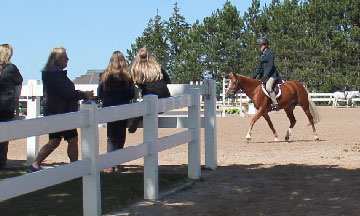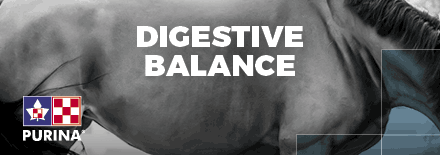Winter is upon us once again, complete with bad weather and freezing temperatures. Although, in general, horses are better able to tolerate the extreme cold than the extreme heat, when the temperature drops they need our help to cope with the vagaries of winter, especially if they spend the season outside. From a nutritional standpoint, there are certain things you should do to help your horse through the winter months.
How to help your horse maintain its body heat
First, it is important to note that the energy requirements (calories) of a horse increase when the outside temperature drops. The colder its environment, the more calories it burns to maintain its body heat. In winter, horses are in danger of weight loss if their increased caloric needs are not met.
In fact, some research suggests that when the temperature reaches -10 degrees Celsius, horses start burning extra calories in order to maintain proper thermoregulation1.
Good quality fiber
What is the best way to compensate for a horse’s increased caloric demands? Although grains and complete feeds are higher in calories than hay, we still recommend providing additional hay during the winter months. Why? Because foods high in fiber are digested in a horse’s cæcum using microbial fermentation, a complex process that produces a large amount of heat and helps the horse fight the cold. Grains, on the other hand, are digested in the small intestine using a much simpler process that, unlike the fermentation of fiber, does not produce much heat. Adding a few bales of good quality hay to an adult horse’s regular diet may be enough to help fight the vagaries of winter, provided the horse demonstrates adequate body condition and is in good health.
Concentrates of fat and fiber
This is not to say that a bit of extra hay is all it takes for a horse to survive the winter without incident. In some cases, adding hay to a horse’s diet is not enough and we must also consider adding or increasing concentrates. Thin horses (whether in training or weight maintenance), sick horses, old horses, mares that are lactating or in late gestation and growing foals are all special cases that will likely benefit from an increase in concentrates. In the winter, they require a complete feed high in fiber and with added fat, especially if their hay is lower in quality. These feeds have two advantages: first, because of their high fiber content, they aid in the production of heat in much the same way as hay, and second, they are higher in calories than hay. This is due to two reasons: the excellent digestibility of the fiber sources in this type of feed and the high percentage of fat, another source of highly digestible calories.
Even if you add extra hay or concentrates to prevent weight loss in winter, we recommend checking with your feed supplier to ensure that your horse’s diet contains an adequate amount of vitamins and minerals. In many cases, a dietary supplement such as Equilizer or Optimal should be considered, especially if concentrates are only provided in small quantities.
Water: The most important nutrient
Water consumption is always crucial. Without enough water, a horse’s body and digestive system cannot function properly. As winter approaches, horses may begin to drink less as the water gets cold and freezes. At this time, horses often transition from food with a high moisture content (pasturing) to a dryer diet (dry hay). These two things are at the root of a common winter problem: impaction colic. It is crucial that horses living outside be given access to quality water at all times as they must consume at least 10 gallons per day. A bucket of half-frozen water or snow is next to useless as it does not fulfill the horse’s basic needs. Moreover, if a horse consumes very cold water, its body temperature will drop and it will have to expend a lot of energy to warm up. The only way to prevent water from freezing in the winter is to invest in a heated water trough. This is the best way to prevent impaction colic and esophageal obstruction in horses… and to avoid potential veterinary fees, not to mention the emotional toll of losing a valued animal. Research shows that horses drink more when water is kept at a temperature of about 18 to 20 degrees C (65 degrees F). Even stabled horses may begin to drink less because, even if the water in the trough does not freeze, it may be too cold for the horse to drink. Consider using individual buckets with concealed heating elements to keep water at the desired temperature. Using hot water to add moisture to feed, especially if it contains fiber, is another great way to get your horse to drink more. Finally, it is important to carefully monitor your horse’s water intake and check its hydration levels regularly using the skinfold test or by monitoring the texture of the manure. If your horse is still not drinking enough water, adding 1 to 2 ounces of salt (100% NaCl) per meal, in addition to a bloc of white salt, is a great way to increase its water intake.
The secret: Monitoring body condition
From a practical standpoint, the most accurate mega calorie calculations cannot take the place of monitoring a horse’s body condition. It is important to focus on the manual component of assessing body condition because from October to April-May, a horse’s winter coat can be misleading, giving every animal a rather portly appearance. Every 15 to 30 days during the winter, it is important to palpate your horse to determine the amount of subcutaneous fat deposits at the ribs, withers, topline and tail head, as well as behind the shoulders and along the neckline. This rating system is the best way of determining whether a diet is sufficiently high in calories, while allowing for dietary adjustments as your horse loses or gains weight. For adult horses spending the winter outside, a score of 6 on a scale of 1 to 9 (1 for an emaciated horse, 9 for an obese horse) indicates that it has the fat reserves it needs to weather the winter more easily. Avoid the nasty shock of a skinny horse in the spring when it loses its winter coat!
(1) Thermoregulation: The regulation of body temperature










